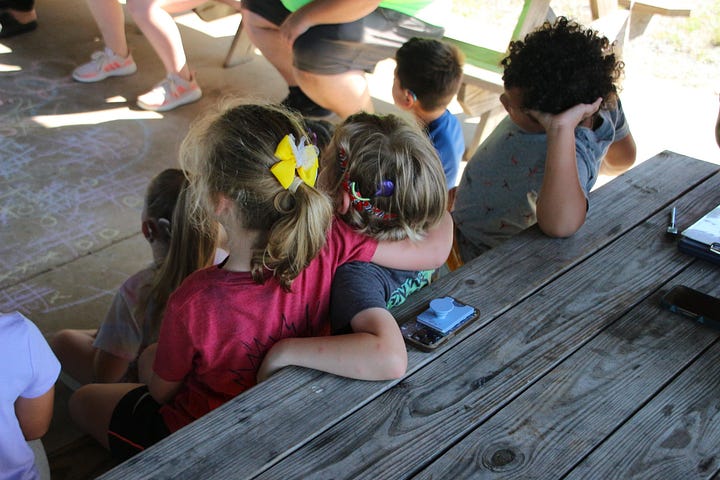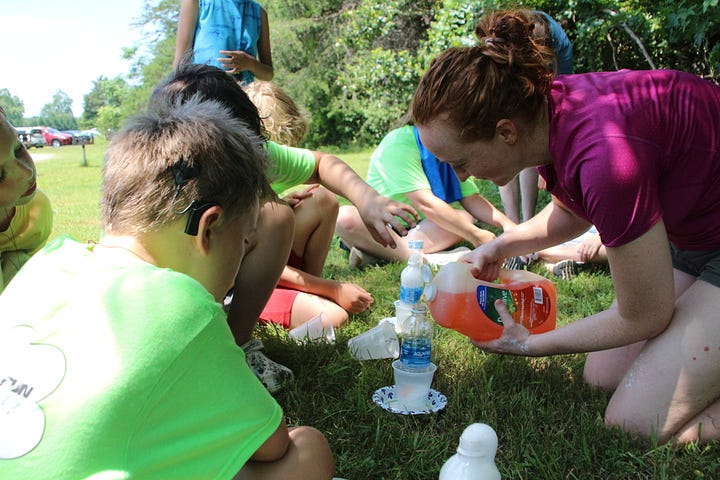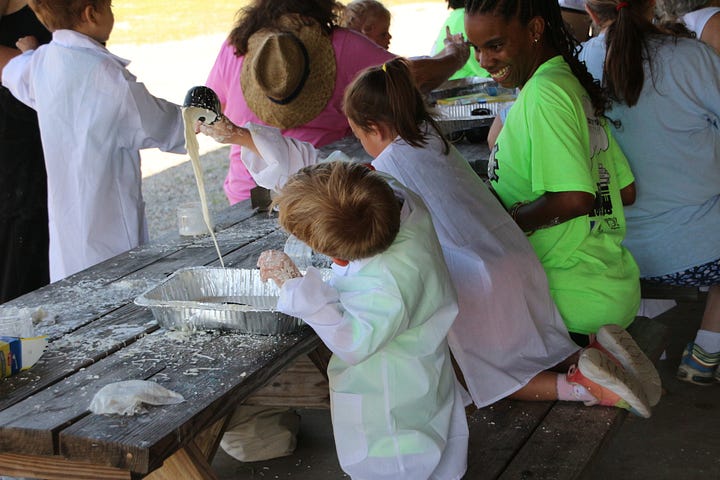Signs of Fun Offers the Traditional Summer Camp Experience to Children with Deafness
"It’s really magical for me seeing these kids build those connections and strengthen their language capabilities."
By Arianna Salvador
INTERN


Summer camp is a staple in many young children’s lives. In the thick heat of summer, they learn leadership skills, build long-lasting friendships, and, most importantly, have fun.
But Arlene Van Horn, the founder of Signs of Fun, noticed that in a society built for able-bodied people, there are few spaces like these for children who are hard of hearing or identify as deaf.
Van Horn, a teacher for the deaf and hard of hearing, wanted to create a camp environment specifically for campers who are either deaf, or are the sibling or parent of someone deaf.
“I started the Signs of Fun Camp in 1995 so that my preschool students would have access to communication (ASL) in the summer and have a camp experience,” Van Horn, who has a master’s degree in early childhood special education, wrote on the Signs of Fun website.
The camp is a space for deaf children to create long-lasting memories without language barriers in an environment of mostly ASL, or American Sign Language, speakers.
“It’s really magical for me seeing these kids build those connections and strengthen their language capabilities,” said Jordan Bennett, Signs of Fun’s art teacher. “[And] seeing them help each other out, explore the language, and...[make] friends.”
Signs of Fun is a week-long day camp that occurs each summer at the Wilderness Presidential Resort in Spotsylvania. Campers aged 6-18 get to participate in classic camp activities ranging from swimming and hiking to arts and crafts.
While Signs of Fun is traditional in some of its camp activities, organizers like to put a twist on it. Each year, there’s a theme for the entire week, and every activity is centered around that theme.
This week, counselors, interpreters, and other volunteers all wore shirts decorated with the latest—the acronym STEAM, which stands for science, technology, engineering, arts, and mathematics.
To connect with this theme, the camp hired Atomic Hands, an organization dedicated to promoting and encouraging STEAM topics for the deaf community. For one project, the founders of the organization, Alicia Wooten and Barbara Spiecker, had a group of children create a homemade volcano out of clay, play-dough, and empty water bottles.
The camp also encourages an interactive and inclusive environment, prioritizing group play among the campers. On Tuesday, the children were split into two groups, Deaf and Hearing. From there, each group participated in games that required teamwork to complete.
The camp also employs counselors, volunteers, and interpreters who are deaf or know ASL. They don’t just supervise, but they also interact and engage with the campers.
“We really try our hardest to make sure that the children, [the] deaf and hard of hearing, [get] an experience that’s full of access,” said counselor Cynthia Ascensio. “Because a hearing camp wouldn’t be able to provide language access like that, or cultural access. Here the opportunity is even and is the same as if they were in a hearing camp.”
The camp also strives to foster a sense of belonging and community.
In a society that communicates mainly through spoken languages, deaf children often feel isolated in everyday life. However, the interpreter mentor, Susan Schultz, pointed out that Signs of Fun gives campers the community they might be missing out on.
“...These kids see all these kids [are] the same,” Schultz said. “And it’s like, ‘Wow, I am not alone’...And every year, they can’t wait until next year, when they can all get together again.”
Camp director Rebecca Bennett also emphasized the importance of allowing children, especially those who are deaf, to act like children. She noted that many times, deaf children have an interpreter or another adult with them, limiting their ability to act freely.
“Now that they are here, they can do what they want,” Bennett said. “They have that freedom, they have that fun, and they can be kids.”


Bennett also prioritizes the involvement of the parents to reduce language barriers even further. According to the Signs of Fun website, the parents are able to sign up for a class in ASL while the kids are away at camp. With many campers coming from hearing households, learning ASL broadens communication between the parent and child.
“The kids right now—there is not one who is broken. They are all the same as hearing kids,” Bennett said. “We don’t focus on the hearing part, we focus on the receptive part. [Because] we don’t need to hear, we can play [and] we can work the same. You’re normal, we’re normal. My goal here is really to teach the parents.”
Bennett recalled an instance in which a camper became upset after being unable to communicate with his mother. After camp was over, the boy excitedly signed to his parents about his day, only to realize his mother did not understand.
“I said, ‘Your mom said you were crying, you were so upset that you missed camp. Why did you miss camp?’” Bennett recalled. “And he said, ‘No, it was fun. I just wanted to explain to Mom and tell [her] everything that happened.’ But she couldn’t understand. That’s what caused him to cry. That breakdown in communication—it’s very tough for these kids.”
Overall, Bennett said the camp’s main goal is prioritizing language and giving the kids access to express themselves in the way they understand best.
“Language matters the most,” she said. “And that’s what camp is set up for.”
Support the Advance with an Annual Subscription or Make a One-time Donation
The Advance has developed a reputation for fearless journalism. Our team delivers well-researched local stories, detailed analysis of the events that are shaping our region, and a forum for robust, informed discussion about current issues.
We need your help to do this work, and there are two ways you can support this work.
Sign up for annual, renewable subscription.
Make a one-time donation of any amount.
Local Obituaries
To view local obituaries or to send a note to family and loved ones, please visit the link that follows.
This article is published under Creative Commons license CC BY-NC-ND. It can be distributed for noncommercial purposes and must include the following: “Published with permission by FXBG Advance.”












